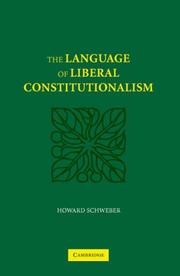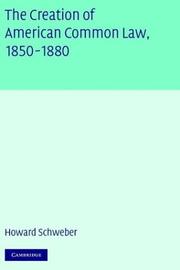| Listing 1 - 3 of 3 |
Sort by
|

ISBN: 9780511498695 9780521861328 9780521108331 9780511296406 0511296401 0511295634 9780511295638 0511294859 9780511294853 0521861322 1107168104 9781107168107 9786610959556 6610959552 1139131818 9781139131810 0511498691 0511294050 9780511294051 0521108330 128095955X Year: 2007 Publisher: Cambridge New York Cambridge University Press
Abstract | Keywords | Export | Availability | Bookmark
 Loading...
Loading...Choose an application
- Reference Manager
- EndNote
- RefWorks (Direct export to RefWorks)
This book explores two basic questions regarding constitutional theory. First, in view of a commitment to democratic self-rule and widespread disagreement on questions of value, how is the creation of a legitimate constitutional regime possible? Second, what must be true about a constitution if the regime that it supports is to retain its claim to legitimacy? Howard Schweber shows that the answers to these questions appear in a theory of constitutional language that combines democratic theory with constitutional philosophy. The creation of a legitimate constitutional regime depends on a shared commitment to a particular and specialized form of language. Out of this simple observation, Schweber develops arguments about the characteristics of constitutional language, the necessary differences between constitutional language and the language of ordinary law or morality, as well as the authority of officials such as judges to engage in constitutional review of laws.
Constitutional law --- Law --- Legitimacy of governments --- Governments, Legitimacy of --- Legitimacy (Constitutional law) --- Consensus (Social sciences) --- Revolutions --- Sovereignty --- State, The --- General will --- Political stability --- Regime change --- Jurisprudence --- Language, Legal --- Legal language --- Legal style --- Style, Legal --- Bill drafting --- Constitutional limitations --- Constitutionalism --- Constitutions --- Limitations, Constitutional --- Public law --- Administrative law --- Language --- Philosophy --- Interpretation and construction --- Constitutional law. --- Legitimacy of governments. --- Language. --- Philosophy. --- Arts and Humanities

ISBN: 9780511509919 9780521824620 9780521158183 0511166265 9780511166266 9780511164330 0511164335 0521824621 0511184409 9780511184406 051150991X 1280437405 9781280437403 9786610437405 6610437408 1107146437 9781107146433 0511313004 9780511313004 0511165137 9780511165139 0521158184 Year: 2004 Publisher: Cambridge, UK New York, NY Cambridge University Press
Abstract | Keywords | Export | Availability | Bookmark
 Loading...
Loading...Choose an application
- Reference Manager
- EndNote
- RefWorks (Direct export to RefWorks)
This book is a comparative study of the American legal development in the mid-nineteenth century. Focusing on Illinois and Virginia, supported by observations from six additional states, the book traces the crucial formative moment in the development of an American system of common law in northern and southern courts. The process of legal development, and the form the basic analytical categories of American law came to have, are explained as the products of different responses to the challenge of new industrial technologies, particularly railroads. The nature of those responses was dictated by the ideologies that accompanied the social, political, and economic orders of the two regions. American common law, ultimately, is found to express an emerging model of citizenship, appropriate to modern conditions. As a result, the process of legal development provides an illuminating perspective on the character of American political thought in a formative period of the nation.
Common law --- Customary law --- Customs (Law) --- Folk law --- Usage and custom (Law) --- Social norms --- Time immemorial (Law) --- Anglo-American law --- Law, Anglo-American --- History --- Social Sciences --- Political Science
Book
ISBN: 9781139058438 9781107015333 9781107415393 9781139191142 1139191144 1107015332 1107230179 113918007X 1283384213 9786613384218 1139189859 1139188542 1139183923 1139186248 1139058436 110741539X Year: 2012 Publisher: New York Cambridge University Press
Abstract | Keywords | Export | Availability | Bookmark
 Loading...
Loading...Choose an application
- Reference Manager
- EndNote
- RefWorks (Direct export to RefWorks)
"Democracy and Authenticity examines a basic problem for liberal democracies. In a polity that is characterized by real diversity of identities and values, what kinds of justifications are appropriate for coercive government actions? In particular, this book argues that justifications that are based on particular religious or other doctrines that are not accessible to nonadherents cannot be a proper basis for government actions that affect everyone. Instead, the book develops a model of public justification that is intended to guide citizens in a liberal democracy through the work of creating a politics that satisfies their responsiblities to one another"--
Authenticity (Philosophy) --- Democracy --- Liberalism --- Liberal egalitarianism --- Liberty --- Political science --- Social sciences --- Philosophy --- Liberalism. --- Philosophy. --- Social Sciences --- Political Science --- Political philosophy. Social philosophy --- Political systems
| Listing 1 - 3 of 3 |
Sort by
|

 Search
Search Feedback
Feedback About UniCat
About UniCat  Help
Help News
News